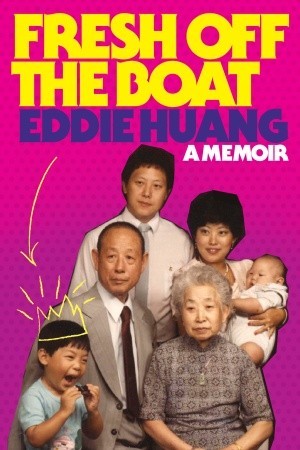 I am the straightest arrow you'll ever meet - I'm a downright prude when it comes to sex, drugs, and violence - so I purposely put off reading this book for years. I knew that Eddie Huang, and this book, had a reputation of being crass, brassy, and overdone, but as a child of immigrants from Taiwan, someone who loves Chinese/Taiwanese food and is a big fan of the Fresh Off the Boat TV show, I've kept this book on my to-read list, and I finally got around to reading it.
I am the straightest arrow you'll ever meet - I'm a downright prude when it comes to sex, drugs, and violence - so I purposely put off reading this book for years. I knew that Eddie Huang, and this book, had a reputation of being crass, brassy, and overdone, but as a child of immigrants from Taiwan, someone who loves Chinese/Taiwanese food and is a big fan of the Fresh Off the Boat TV show, I've kept this book on my to-read list, and I finally got around to reading it.
This book definitely is not for everyone. Making my way through early chapters, I fully expected to rate the book no higher than 3 stars. Huang uses the slur "Chinaman" the way black people have reclaimed the n-word, except it's not really a thing in the wider Chinese community, so it's jarring. The narrative includes plenty of profanity, makes obscure (to me) references to hip-hop and sports culture, and employs so much slang that I sometimes actually did not understand what Huang was trying to say. Luckily, I do have a working knowledge of basketball, so I could follow lines like, "[Mom's] still the best cook in the family...even the aunts admit my mom goes hard in the paint," (pg. 5) and, "I was into glasses, especially goggles, because Kareem wore them and he had the ill sky hook." (pg. 6)
I knew that Huang had walked away from the TV show because he didn't feel the show accurately represented his family, but I did not know just how much his family was sanitized for American TV audiences. I think the show presents an Asian-American family that is exactly what Americans are willing to accept at this time, but I also believe that Huang's actual origin story is profound in the way it shines a light on the struggles of immigrant families and the diversity of experiences that exist within a group perceived as homogeneous.
What really struck me about Huang's autobiography is how I could simultaneously identify so strongly with some of his experiences - being called "chink", eating at a white friend's house for the first time and encountering new-to-him American foods, feeling a kinship with Chinese/Taiwanese culture by knowing and appreciating the food - but then be so completely taken aback by some of his life choices. On the one hand, he hated the model minority stereotype, yet he participated just enough to show that, "I didn't want to play their stupid Asian Olympics, but I wanted to prove to myself that if I did want to be the stereotypical Chinaman they wanted, I could." (pg. 189) He took honors classes, attended academic summer camps, went to the "Love Boat" study tour in Taiwan, and even became a lawyer, but then he also did drugs, sold drugs, got into fights, and got arrested for assault! I appreciate that this book absolutely took me out of my comfort zone and challenged my own notions of what it means to be Asian-American.
Ultimately, I think this book is about Huang's struggle with identity, his constant efforts to not be defined as others see him and to figure out not only what it means to be true to himself, but also what it means to be an American while also being Asian-American. Huang wrote this book when he was just 30 years old, so it lacks the kind of gravitas you might expect from memoirs in general; it's clear that life to him is about living and learning, and he's just getting started. I recommend this book to anyone interested in exploring race and better understanding the experiences of immigrant families. It's definitely best approached with an open mind free of preconceived notions.


No comments:
Post a Comment